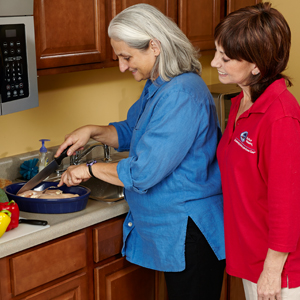Vitamin D Deficiency and Its Effects
Recent advances in science show that vitamin D plays an important role in the proper functioning of the body and can help prevent many diseases and conditions.
 Aging brings about symptoms one may never have experienced in his younger years: fatigue, muscle pain and weakness, joint pain, poor concentration, restless sleep -- the list goes on. These symptoms may be the result of normal wear and tear on the body over the years. They are also symptoms of vitamin D deficiency, a potentially serious condition that has gotten more attention over the years, especially in regard to the senior population. It is estimated that more than 40 percent of seniors do not have enough vitamin D in their systems.
Aging brings about symptoms one may never have experienced in his younger years: fatigue, muscle pain and weakness, joint pain, poor concentration, restless sleep -- the list goes on. These symptoms may be the result of normal wear and tear on the body over the years. They are also symptoms of vitamin D deficiency, a potentially serious condition that has gotten more attention over the years, especially in regard to the senior population. It is estimated that more than 40 percent of seniors do not have enough vitamin D in their systems.
For years, experts believed that vitamin D's benefits were limited to teeth and bones. However, recent advances in science show that vitamin D plays an important role in the proper functioning of the body and helps prevent many diseases and conditions. Fatty fish, as well as fortified dairy products, juices and cereals, contain small amounts of vitamin D. However, 80-90 percent of vitamin D is obtained by exposure to sunlight.
Researchers have found several factors that put seniors at greater risk for vitamin D deficiency. Seniors who do not leave their homes -- because of physical limitations or other factors -- do not receive the benefits of the sun's rays. Active seniors must bear in mind that age-related changes in the skin decrease its ability to synthesize sunlight into vitamin D. Also, kidney function decreases with age, which inhibits the body's ability to properly process the vitamin.
Studies have found that vitamin D deficiency contributes to osteoporosis, muscle weakness, hip fractures, diabetes, cancer, heart disease, arthritis and poor general health. The New England Journal of Medicine recently studied vitamin D and how it prevents fractures in seniors. While the recommended dosage of vitamin D varies from person to person, the study showed that it takes a daily dose of at least 800 international units of vitamin D to consistently prevent broken bones. This dosage reduced the risk of hip fractures by 30 percent and other breaks by 14 percent. The study also demonstrated that too much calcium, more than 1,000 milligrams per day, might dilute vitamin D's benefits to bones. (As we mentioned before, the required amount of calcium varies by individual. Always check with your doctor before taking a calcium supplement or any other nutritional supplement.)
The symptoms of vitamin D deficiency are easy to miss. While they vary from person to person, the following is a list of symptoms that seniors with this deficiency may experience:
- Fatigue
- General muscle pain and weakness
- Muscle cramps
- Joint pain
- Chronic pain
- Weight gain
- High blood pressure
- Restless sleep
- Poor concentration
- Headaches
- Bladder problems
- Constipation or diarrhea
Those caring for seniors who notice these symptoms should advise a trip to the doctor.
- The following tips can help seniors increase vitamin D intake. Always ensure that the senior you care for consults a health care provider before considering any of these suggestions.
- Researchers suggest 10 minutes of uncovered sun exposure three times a week, without the use of sunscreen.
- Supplements, such as a multivitamin, help if approved by a physician.
- Help the senior in your life choose foods that are high in vitamin D such as cod liver oil, salmon, mackerel, tuna, beef liver, cheese and egg yolks.
- Help the senior find foods fortified with vitamin D. These foods include milk, breakfast cereals and juice drinks. While the daily diet may not provide the amount of vitamin D required, studies show that these foods can increase vitamin D levels in the body.
Even though the symptoms of vitamin D deficiency are subtle, there are many ways to prevent or counteract it. Consult your physician if you think you, or a senior loved one, is affected by vitamin D deficiency or any other nutrition-related condition.
References
- Age and Aging (2008). Vitamin d deficiency: can old age learn from childhood? Retrieved on 12/28/12 from https://ageing.oxfordjournals.org/content/37/1/6.full.pdf+html
- Emery, Gene (2012). High-dose vitamin d prevents fractures in elderly. Retrieved on 12/28/12 from https://reuters.com/article/2012/07/05/us-vitamind-idUSBRE86414220120705.
- Mosekilde, Leif. Clinical Endocrinology (2005). Vitamin d and the elderly. Retrieved on 1/23/14 from onlinelibrary.wiley.com/doi/10.1111/j.1365-2265.2005.02226.x/full
- Holick, M.D., Ph.D., Michael F. (2007) The New England Journal of Medicine (2007). Vitamin D Deficiency. Retrieved 1/24/14 from grc.com/health/pdf/vitamin_d_deficiency_medical_progress.pdf
- WebMD.com. Vitamin d. Retrieved on 1/23/14 from webmd.com/vitamins-supplements/ingredientmono-929-VITAMIN+D.aspx?activeIngredientId=929&activeIngredientName=VITAMIN+D&source=3
- MayoClinic.com. (2013) Vitamin D. Retrieved on 1/24/13 from https://mayoclinic.org/drugs-supplements/vitamin-d/background/HRB-20060400
- Jegtvig, Shereen. About.com (2014). Vitamin D Deficiency Signs and Symptoms. Retrieved on 1/24/14 from https://nutrition.about.com/od/therapeuticnutrition1/a/Vitamin-D-Deficiency.htm
Sign up to receive helpful info right to your inbox.
We understand choosing an in-home care provider can be a difficult decision, and we want to make your journey as easy as possible. We're here to support you by providing helpful senior care tips and information on in-home care and senior health and wellbeing topics.
Start a Job with a Purpose
Uplifting training and support for you every step of the way.
Apply to be a caregiver







